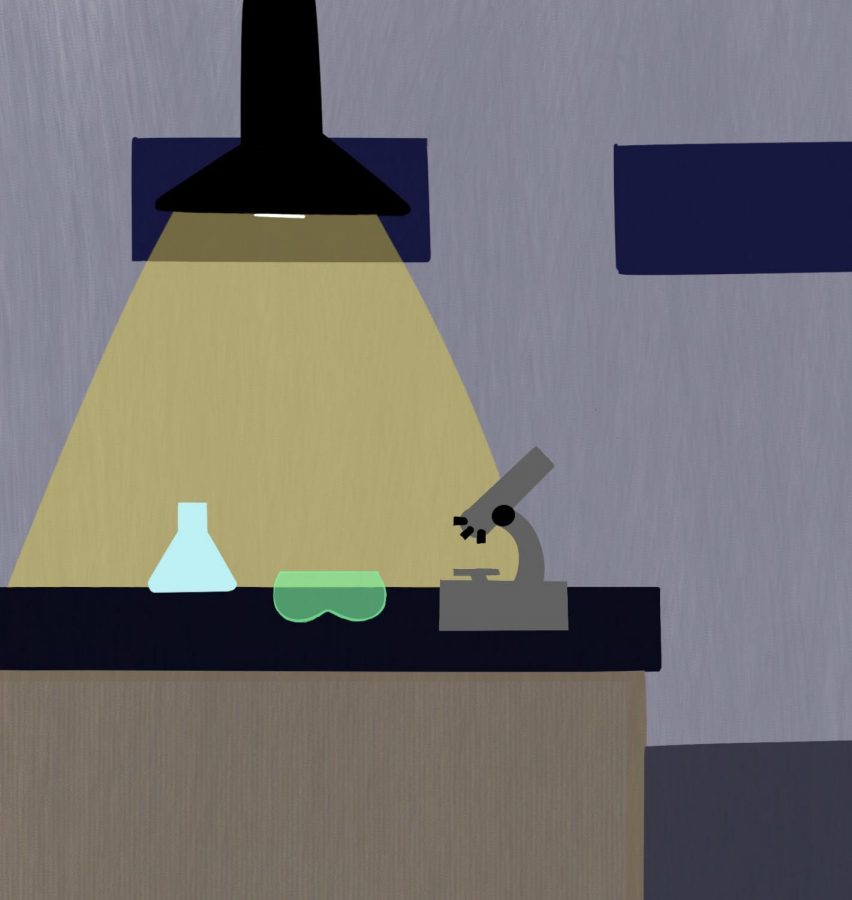Q&A with STEM majors dealing with virtual learning
April 28, 2020
We have seen COVID-19 take over the fast-paced daily lives of UTSA students by forcing all face-to-face classes to move exclusively online. All students depend on face-to-face classes to grasp many ideas and concepts within subjects, and it has been a major adjustment for all. Students in science, technology, engineering and math (STEM) departments are experiencing the effects of quarantine on their classes in ways such as presenting their end-of-semester projects online or working through labs from home. A variety of STEM majors feel differently about the transition to online classes during these difficult times. Students studying disciplines ranging from biomedical engineering to medical humanities answered questions about taking online classes as STEM majors.
Ashley Ridoutt, junior biomedical engineering major:
Q: Are there any end-of-semester projects in your classes? If so, how are they working?
A: Yes, I have two classes that are requiring end-of-semester group projects. Both require that we present them online on the Blackboard collaborate or on the Zoom platform. Previously, it was required for one project that we use 3-D printers to print our product. Unfortunately, now we are subjected to using Solidworks to create our end product which is a program in which you can virtually create a 3-D product. For communication, groups mostly Groupme to split work and keep each other informed.
Q: How are engineering majors dealing with online classes?
A: I can confidently say that this is every upperclassemen’s nightmare if they are working towards an engineering degree. Do not get me wrong, UTSA has done a great job transferring classes to online. The communication between students and professors about the heavy workload that can happen with moving classes online is impeccable and I am very grateful. I would have had to drop out of a class if they did not listen to us. It is very difficult to learn engineering content virtually. Again, it is not any of the professor’s fault because they do their best to answer questions when they can, but it is just easier in a classroom setting where they can see student’s faces and realize, “oh, they are still confused,” or “let me restate this for them.” It is also easier to bounce ideas around or learn from other peer’s questions which is an important quality to an engineering classroom.
Sebastian Espinoza, sophomore electrical engineering major:
Q: How are engineering labs working now that online-exclusive classes are taking place?
A: In terms of labs, I didn’t really have any labs this semester. However, the closest thing to a lab I had was one of my programming classes that required a lot of working with partners and hands-on learning. With the transition to online classes, many things have to be self-taught with online simulators. It is not the worst thing, however it’s causing me to step out of my comfort zone by teaching myself rather than a professor teaching me.
Q: What is the hardest thing about taking online classes as an engineering major?
A: I believe the hardest thing about taking online classes as an engineering major is the fact that my courses are starting to become more rigorous. Growing up all these years, all I have done was learn from a lecturer, face-to-face in a learning environment. Present time, I am now being forced to an online setting from the comfort of my own home. It is really the comfort that gets you the most. I have a hard time focusing on my classes when my classroom is my bedroom. It is more of a personal struggle that I tried to avoid by taking my harder classes in person, but in this situation, I don’t have much of a choice and all I can do is adapt.
Brittany Culp, sophomore medical humanities major:
Q: How have online classes affected your chemistry labs?
A: Luckily, I only took a General Chemistry II lab, so I only have one lab to worry about. Since we are practicing social distancing, the online lab consists of notes from lab lecture and then we use those notes to try to complete all of the lab questions. It makes it a little harder to understand the concepts because all we are doing now is filling in blanks without the hands-on experience the lab provides.
Damaris Natividad, freshman biology major:
Q: How have online classes affected your labs?
A: My chemistry lab was moved to a virtual setting and it made it harder to understand without having someone there to explain it fully. My biology lab was, I believe, the most affected by COVID-19 because some labs were meant to be worked on with live animals and obviously we are not able to do that from home, so our TA’s shared predicted results with us in order for us to do the post-lab assignments. We also weren’t able to do the experiment for our group proposal, so we have to complete our report on what we predict would have happened.
Q: What are some things that have changed for your biology major because of COVID-19?
A: Some things that have changed for my biology major was the possibility of not having the full extent of my basic knowledge. Since I am still taking core classes, I would need the classes I am taking right now to refer back to in the future, but how would that be helpful if I am struggling to teach it to myself? On top of that, I understand that my teachers are trying to adjust as much as they can, but they still would not be able to provide me with all of the information and help they could if it was a face-to-face class.
Sophia Villagran, senior mathematics major:
Q: How has COVID-19 affected your work as a math major? Are there any changes happening within your classes?
A: COVID-19 has affected my course work drastically. Being a math major, it is already difficult to understand the material in person, and is now even worse via online classes. My math courses require my professors to physically write out formulas and other mathematical notations that are not an easy task to type out. Our homework assignments are now required to be scanned and emailed to our professors, but if you do not have an all-in-one printer, then what are you supposed to do? I know that some of my professors are struggling with the use of technology that they have never had to use before. This, in turn, affects students because we are not getting the quality education that we originally signed up for.
Q: What is the hardest part about the changes?
A: I think the hardest part about all of this is just trying to get in contact with all of my professors. Some aren’t as easily accessible anymore since they are trying to balance their work and their home life, whatever that may look like. I know this is not an ideal situation and everyone is in the same boat, but I believe that it could have been better handled by UTSA.
STEM students and professors are doing everything they can to smoothly work through this pandemic. However, with all of the changes they have had to endure, it can become exhausting. Many students are struggling, and it is important for the university to collectively recognize the hard work of STEM majors. With each STEM major dealing with different changes, professors should show empathy toward their students to encourage perseverance and understanding on all levels.









stem courses • Oct 6, 2021 at 12:48 am
I never read anything like this before. It’s content is valuable to me. Excellent piece!
stem courses • Aug 13, 2021 at 12:12 am
I couldn’t refrain from commenting. Exceptionally well written!
Brian Clair • Jan 8, 2021 at 1:27 am
Today’s students are tomorrow’s pioneers. Occupations in STEM-related professions are probably the quickest developing and best paid of the 21st century, and they frequently have the best potential for work development.
The most ideal approach to guarantee future achievement and life span is to ensure that the students are well versed in these subjects.
Building a strong STEM Foundation through a balanced educational plan is the most ideal approach to guarantee that understudies are presented to math, science, and innovation all through their instructive profession. “If we want a society and culture that work for everyone, we need innovation in our relationships along with innovation in the STEM fields and STEM education”.
The craze for STEM Learning has now significantly increased in young students. The universities are coming up with various STEM Learning Programs in collaboration with other institutions & researchers.Thanks!!